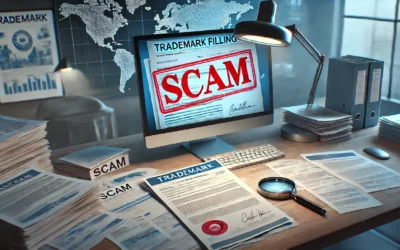OpenAI has registered trademark GPT in the EU. However, storm clouds are gathering over the registration. Its validity has been challenged. Meanwhile, in the US the USPTO rejected the registration of trademark GPT for lack of distinctive character. Mark GTP illustrates many important issues of trademark law.
Defensive registrations
GPT is one constituent element of the very successful brand ChatGPT. It is common for companies to protect variants and components of their trademarks individually. For example, McDonald’s has registered trademark Mc, and Alibaba has registered trademarks ALI and ALIMAMA.
Defensive registrations are like building an extra layer of protection around the mark. They are used to broaden the zone of exclusivity around the main trademark (like ALIBABA or McDonald’s). This way, they can take action against other trademarks even in situations where the other trademark might not be sufficiently similar to the main trademark.
One aspect of this practice is that five years after the registration is granted, the mark becomes under “use obligation”. If it is not used, it can be canceled. If Alibaba only used the mark ALIBABA, their mark ALI could be canceled for non-use. Same for OpenAI. If they manage to keep the trademark GPT alive, in five years (after registration) they might have to prove that they have used trademark GPT (without other elements) or face having it canceled for non-use.
Distinctiveness of acronyms
GPT is an acronym. Acronyms are words or letter combinations that have been formed from the initial letters of other words. You might not always notice it, but many famous trademarks are acronyms. Examples include CNN, HBO, IBM, KFC, UPS, BMW, GE, NASA, FIAT, etc.
Acronyms can function as trademarks, provided that they are not descriptive. Some acronyms are understood as generic non-distinctive terms that cannot function as trademarks. These include, for example, GPS (global positioning system), NFT (non-fungible token), and laser (light amplification by stimulated emission of radiation). If it is generally known that the acronym refers to an expression that is in itself non-distinctive (like “global positioning system), the acronym is also non-distinctive. If the acronym is not associated with any underlying descriptive phrase, the acronym can function as a distinctive trademark, as illustrated by brands like BMW and HBO.
OpenAI’s trademark “GPT” is an acronym for “Generative Pre-trained Transformer”. While the EUIPO has accepted OpenAI’s trademark GPT, the US Patent and Registration Office (USPTO) has taken another view. They have refused OpenAI’s trademark application, stating that “applicant’s mark “GPT” is an acronym for the wording “generative pre-trained transformer.”… [S]uch wording is commonly used in applicant’s industry to refer to a particular type of software featuring artificial intelligence (AI) that generates responses based on a pool of pre-existing resources that the software uses to generate its responses to user questions“.
Every trademark is assessed independently in each country
Contrary to USPTO, the EUIPO has taken a view that GPT is not understood to refer to “Generative Pre-trained Transformer”. This highlights the fact that the registrability of a trademark is determined independently in each country. It is normal that different countries reach different conclusions, even if the underlying principle is the same in both countries.
Both EUIPO and USPTO take the view that if an acronym refers to a phrase that is descriptive and commonly used in the industry, also the acronym is non-distinctive. Nonetheless, even if the fundamental rules are very similar in most countries, conclusions drawn in individual cases might be the opposite. The EUIPO has (at least originally) taken the view that the European target audience does not understand the acronym GPT to refer to a descriptive phrase, whereas the USPTO has adopted the view that the relevant American target group knows the meaning behind GPT.
Mark GPT has also been preliminarily refused in Canada, but registered in Switzerland.
Acquired distinctiveness for GPT as part of ChatGPT
Even if a trademark, acronym or otherwise, is descriptive, it is still possible that it becomes distinctive through use. For example, the famous bicycle race “LE TOUR DE FRANCE” is clearly inherently descriptive, but due to the long-lasting and successful use of the mark, it has become known as a particular sporting event. The name is now generally understood to refer to a particular event. It is not thought to refer to just any tour around France.
Trademark ChatGPT is certainly very well-known by now. Even if the acronym GPT is in itself descriptive, it may become distinctive through the use of the mark ChatGPT. It is possible for a trademark to acquire distinctiveness when used as part of another mark. The EU court has confirmed, for example, that use of the slogan “HAVE A BREAK… HAVE A KIT KAT”, can establish acquired distinctiveness for the part of the mark, HAVE A BREAK.
Similarly, the use of ChatGPT can result in the mark GPT acquiring distinctiveness if the target group of the mark associates GPT with OpenAI’s services. For an inherently descriptive phrase to be registered as a trademark, it must acquire distinctiveness before the application is filed.
A trademark registration is never carved in stone
Even if you have a registered trademark, it is possible to lose the registration. This can happen in various ways. Somebody might challenge the registration on the basis it was wrongfully registered in the first place. It is also possible that a registered trademark no longer satisfies the conditions required for a registered trademark. This can happen, for example, if the name becomes associated with a type of product, rather than its commercial source. For example, the name “heroin” is now widely considered to be a generic term for an illegal drug, rather than a commercial name used by Bayer for its product.
Regarding OpenAI’s trademark GPT, the registration has been recently challenged by a Singaporean company Century TAL Holding Pte. Ltd. They claim that GPT is a non-distinctive term, an acronym referring to “Generative Pre-trained Transformer”. In other words, they take the same position as the USPTO and claim that trademark GPT should never have been registered in the first place. Generic and descriptive names cannot be registered as trademarks because free competition in the marketplace requires that they are free for all companies to use in describing their products and services.
Different scenarios for trademark GPT
OpenAI gets to keep the registration if the acronym is again considered distinctive, or it is considered to have acquired distinctiveness. Since the registration has been granted, it is now possible to show acquired distinctiveness even after registration.
OpenAI will lose the registration if Century TAL Holding Pte. Ltd can convince EUIPO that the mark was originally non-distinctive, and has not acquired distinctiveness after registration. OpenAI will also lose the registration if EUIPO decides that although mark GPT was distinctive when it was registered, it has since then lost its distinctiveness due to it becoming a common term.
Conclusion and prediction
Trademark GPT illustrates many different aspects of trademark law. In addition to the ones mentioned above, another question is whether (and under what circumstances) defensive registrations could be canceled on the basis of having been registered in bad faith to improperly and artificially expand one’s trademark rights.
Here’s a prediction on the fate of OpenAI’s GPT trademark: the EUIPO will cancel the registration. The EUIPO will either decide that the mark was non-distinctive to begin with, or that it has lost its distinctiveness after registration. OpenAI will not be able to demonstrate that GPT has acquired distinctiveness as their trademark.
Read more
Can ChatGPT replace your trademark attorney?
Can you trademark an acronym?


